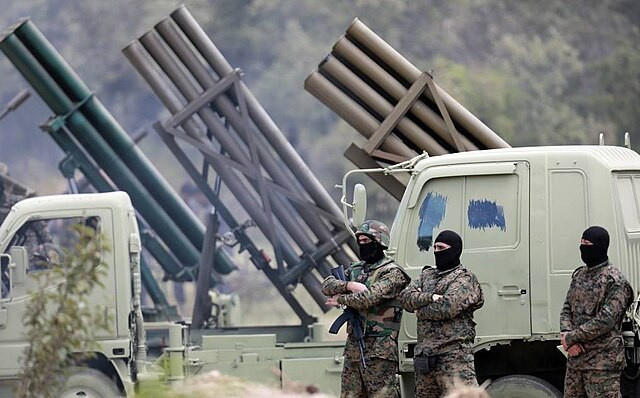The conflict between Israel and Hezbollah has escalated dramatically, with the Iran-backed Lebanese militant group launching a series of rocket attacks on Israel's northern city of Haifa and other regions. On Monday, Hezbollah fired multiple rockets at Haifa, Israel's third-largest city, as Israeli forces appeared poised to expand their ground operations into southern Lebanon. The attacks marked the first time Haifa had been targeted since the 2006 conflict between Israel and Hezbollah, raising fears of a broader confrontation in the region.
Hezbollah claimed responsibility for the strikes, stating that it had used "Fadi 1" missiles to target a military base south of Haifa and launched additional attacks on the town of Tiberias. Israel's military confirmed that approximately 135 projectiles had entered its territory by 5 p.m. local time, injuring at least ten people in Haifa and two more in central Israel. The military's response was swift, with the Israeli air force conducting extensive bombings of Hezbollah targets in southern Lebanon, including missile forces and intelligence units.
As the conflict deepens, the situation on the Lebanese side has become increasingly dire. Lebanon's health ministry reported that an Israeli airstrike on a municipal building in the town of Bint Jbeil killed ten firefighters, while additional strikes over the weekend claimed 22 lives in southern and eastern Lebanon. The escalating violence has displaced more than 1.2 million people in Lebanon, with many fearing the scale of devastation could mirror the destruction inflicted on Gaza.
The Israeli military's ground operations in southern Lebanon have also intensified. Soldiers from the 91st Division recently crossed into Lebanon after a year of operations along the northern border. Although Israel's military has described these incursions as "localized, limited, and targeted," the scale and frequency of the raids have been steadily increasing. Reports indicate that Israeli forces have targeted key Hezbollah positions, aiming to weaken the group's command and control capabilities.
Israeli Prime Minister Benjamin Netanyahu emphasized the need for a robust military response to what he described as "Iran's axis of evil." Speaking at a special cabinet meeting in Jerusalem marking the first anniversary of the Gaza war, Netanyahu stated, "Our counterattack on our enemies is necessary for securing our future and ensuring our security." He added that Israel's ongoing operations were crucial to prevent a repeat of the events that led to last year's conflict.
The rocket attacks from Hezbollah are not isolated incidents but part of a broader regional escalation. The group began launching rockets into Israel on October 8, 2023, in solidarity with Hamas, following a deadly attack by the Palestinian militant group on Israeli civilians near the Gaza border. Since then, Hezbollah has ramped up its military activities, firing rockets into Israel and engaging in direct combat with Israeli troops in southern Lebanon.
In response to these developments, the Israeli air force has carried out waves of airstrikes, targeting over 120 sites associated with Hezbollah, including its elite Radwan forces and missile units. This military campaign aims to degrade Hezbollah's offensive capabilities and provide support to ground operations in the area.
The risk of a broader conflict involving other regional players, such as Iran and the United States, has also grown. Iran, a staunch ally of Hezbollah, launched a series of missile attacks on Israel earlier this month, further inflaming tensions in the already volatile Middle East. Israel has signaled its intent to retaliate against Iran, with possible targets including Iranian oil facilities, raising concerns about a wider war in the region.
The situation remains volatile in northern Israel, where the city of Haifa bore the brunt of Hezbollah's recent attacks. Five rockets were launched towards the city late on Sunday, damaging several buildings and injuring eight people. Eliran Tal, a spokesman for the Haifa municipality, confirmed the damage and noted that this was the first time Haifa had been hit since the 2006 war. "With missile threats from the north, it is not an easy period of time. But we are strong," Tal said, emphasizing the city's resilience.
As Israel's military operations continue to unfold, the conflict's humanitarian toll is mounting. In addition to the civilian casualties in Lebanon, many residents of Haifa and nearby areas have been forced to seek shelter, and there are growing fears of further escalations. Israeli authorities have urged civilians to stay away from southern Lebanon's coastal areas, as the navy prepares to intensify its operations against Hezbollah from the sea.




